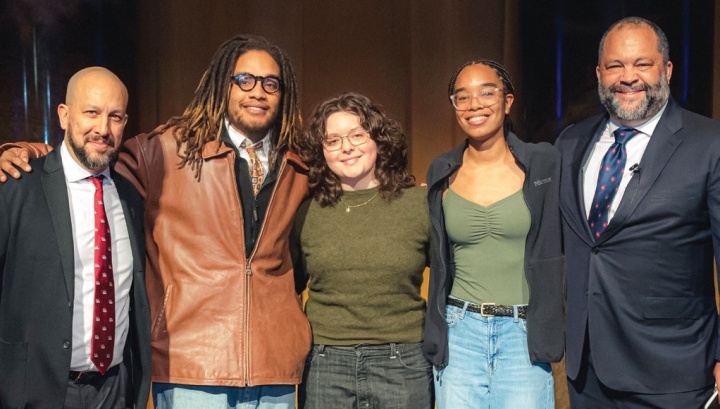Columbia College | Columbia University in the City of New York
UCI Expands Programming
The Undergraduate Community Initiative (UCI) has concluded its second year, with the addition of two first-time undergraduate fellowships stewarded by the Center for the Core Curriculum. Both build upon the foundation of the Core classroom, which fosters community even as students debate and work through ideas that may be very different from their own.
“One of the primary goals driving UCI — and its themes of belonging, service and respect — is forging deeper connections between what students do in the classroom and what they do in their personal lives,” Dean Josef Sorett says. “Ours is a residential academic community and, as such, what students learn from each other, and how they engage with each other in community, is as much a part of their education as what they learn in the academic setting.”
The Practices in Community Building Fellowship focused students on developing projects that bring people together on campus. Central to that was the collaborative aspect; 25 fellows worked in small groups based on their areas of interest (for example, service, storytelling or the arts) to hone their project ideas and begin bringing them to life. The entire cohort also met regularly to hear from guest speakers and discuss assigned readings that tie to the Core, while carving out time individually for volunteerism and reflection.
The Listening Tables Core Student Fellowship, meanwhile, was undertaken in partnership with the Trust Collaboratory and emphasized how students engage with others. Students — who were put in one of two groups — explored ways to navigate discussions about potentially divisive topics with mutual empathy and respect, and documented what it’s like to be part of difficult dialogues.
The fellows group received training in conflict resolution, then led small-group dialogues where participants from a range of backgrounds and perspectives could talk with one another about the difficult and polarizing issues of our time. The ambassadors group used a research method known as “photo voice,” where participants took photographs to capture their experiences at the Listening Tables and in other dialogues, then analyzed their images in order to share their insights with others.
“I have always had confidence in the ability of our students to con- sider and discuss divergent views because I have watched them do it again and again in the Core,” says Larry Jackson, director of the Core Curriculum. “The students in these fellowship programs grappled with some of the most contentious issues of our time, bringing respect, empathy and nuance to those conversations. They have told us that their involvement in these programs has given them hope that change is possible, even as they have developed a deeper understanding of the challenges that make community building and dialogue difficult. Most importantly, the students who have gone through these programs are eager to carry on the work that they started this year.”

Keynote speaker Ben Jealous ’94’s nephew and nieces were in attendance at the MLK event. Left to right: Dean Josef Sorett, Dylan Farley ’25, Nina Feldman BC’25, Emma Farley ’27 and Jealous.
BRANDON VALLEJO
The Community Engagement Mini-Grants were also continued, with funding from $500 to $1,500 awarded in support of campus events that cultivated one or more of UCI’s key values. In the Spring semester, nearly $20,000 was given across 19 events; programming was free to students and welcoming to all. Events ranged from an a cappella festival featuring all of Columbia’s groups, to a spring social for first-years from Columbia College, Columbia Engineering and Barnard College, to a student council-sponsored iftar, where students from all backgrounds could learn about Ramadan and have a meal together.
“Looking to the future,” Sorett says, “with plans already in the works to expand on this year’s success, we see UCI becoming part of the fabric of the College’s integrative approach to an undergraduate experience.”
Issue Contents
Published three times a year by Columbia College for alumni, students, faculty, parents and friends.
Columbia Alumni Center
622 W. 113th St., MC 4530, 6th Fl.
New York, NY 10025
212-851-7852
cct@columbia.edu
Columbia Alumni Center
622 W. 113th St., MC 4530, 4th Fl.
New York, NY 10025
212-851-7488
ccalumni@columbia.edu

